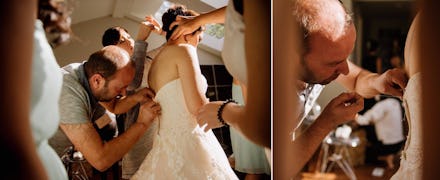Woman learns her Syrian refugee neighbor is a master tailor after saving her wedding dress

Ibrahim Halil Dudu was a master tailor for 28 years when he lived in Aleppo, Syria. He also happened to be Jo Du's savior, when, right before Du's wedding on Sunday in Ontario, Canada — where Halil Dudu and his family resettled — the zipper to her bridal gown broke.
"When I got there everything was going great and then the zipper broke, one side fell off entirely," the wedding photographer, Lindsay Coulter, said in a phone interview.
Coulter posted the story on Facebook Monday, and it has since gone viral. At the time of this article's publications, it has garnered around 25,000 reactions and more than 9,000 shares.
"We tried to fix it for a few minutes and then I said to one of the bridesmaids, 'I saw the neighbor's garage door open, why don't you go ask if they have pliers,'" Coulter said. "She came back and said, 'Hey, so good news: I have pliers and the neighbor next door is hosting a Syrian family and the father is a master tailor.'"
As the bridal triage team attempted to remedy the situation to no avail, there was a knock on the bedroom door.
"Halil Dudu was there with the neighbor and his son. He came in and motioned for everyone to step aside and sewed up the dress on her. Within minutes, she was ready to go."
According to Coulter's Facebook post, Halil Dudu and his family had only arrived in Canada four days prior to the wedding.
"We're so lucky that happened to us, and so grateful," Lee told CTV Kitchener.
"I was so excited and so happy," Halil Dudu said, according to a translator, CTV Kitchener reported. "I like to help Canadian people from my heart."
The global response to this story prompted Coulter to create a GoFundMe campaign, with a target of $10,000 to support Halil Dudu, his family and other Syrian refugees families resettling in Canada. The money would go, for example, to the tailor's families' medical needs, which they are currently unable to afford.
Halil Dudu is just one of 11 million Syrians who have been forced to flee their homes amid the country's civil war. Many of these Syrians left skilled jobs, but remain unemployed in the countries they have resettled in.
"A huge barrier to integration is unemployment and not being able to participate in the labor market," immigration policy analyst Alex Nowrasteh of the Cato Institute said in a phone interview.
Integration and employment have both emerged as big problems in a number of host countries across Europe and North America.
There are multifarious obstacles refugees face when looking for jobs. Laws and bureaucracy aside, lack of language skills and credentialing are also issues, explained Robert L. McKenzie, a visiting fellow at Brookings Institute for the Project on U.S. Relations with the Islamic World.
"I spoke at length with a Syrian refugee who talked about his deep disappointment that he was a very successful dentist in Syria, but now he's unemployed in Germany," McKenzie said in an interview.
"People are very concerned that with all these unplanned arrivals of refugees, they could unintentionally not be integrated, which would create parallel societies," he added.
Legislative overhaul is necessary to lower barriers to entry into the labor force for refugees and migrants, according to Nowrasteh. Many countries have working bans for refugees and asylum seekers for up to a year, along with self-employment bans, he explained. Removing those would be a first step.
"Then there's priority checks, which mean companies have to hire Germans first, then E.U. citizens, then citizens from other countries: The end result is basically refugees will never get hired," Nowrasteh said.
The Cato Institute policy analyst contends many of these host countries should introduce Shortage Occupation Lists, which allow migrants to be hired in industries where there are labor shortages — these Shortage Occupation Lists should be expanded, particularly for educated and skilled workers.
According to the State Department's Bureau of Population, Refugee and Migration, of the Syrian refugees who have entered the U.S. in the past two years, around half have completed primary or middle school. Education levels for around a quarter are yet unknown, but most of the remaining refugees have completed secondary school, university, technical or graduate schools.
"Allowing refugees and migrants to work is absolutely essential from a fiscal perspective — it will ensure they cost tax payers less — but it's also crucial in allowing these refugees and their children to build a life in their host countries," Nowrasteh concluded.
"Above all, allowing them to work is essential from a psychological perspective — it makes people feel like they're valued and valuable."